|
|
|
Sort Order |
|
|
|
Items / Page
|
|
|
|
|
|
|
| Srl | Item |
| 1 |
ID:
137392


|
|
|
|
|
| Summary/Abstract |
The Tahmineh and Rostam episode, as presented in modern text-critical editions of Ferdowsi's Shahnameh, is compared vis-à-vis both the pre-modern scribal interventions in the manuscript tradition of the poem, as well as two oral presentations of the same episode by traditional storytellers (naqqālān), as preserved in their prompt-books (tumārs) and in recorded performances from the twentieth century. The mise-en-scène, the social circmstances, as well as the expansive nature of such oral performances, are described, and a translation of an oral version of the Rostam and Tahmineh episode is given. The narrative strategies employed to negotiate the intersection of new episodes or contemporary moralistic considerations with the written text of Ferdowsi's Shahnameh are then explored, analyzing the nature, motivations and functions of the scribal and oral interpolations to the Tahmineh episode, and demonstrating how modernizing reinterpretations impart a certain dynamism to the living Shāhnāmeh tradition. The naqqālān are shown to alter the Tahmineh episode to comply with the moral and religious values of their audiences, the requirements of extended narration cycles, and the horizon of expectation of the genre of epic. The article closes with a brief consideration of how moral and religious values apply differentially across various genres (heroic epic, romance, etc.), and how these differing horizons of expectation impact the reinterpretation of the narrative material.
|
|
|
|
|
|
|
|
|
|
|
|
|
|
|
|
| 2 |
ID:
188229


|
|
|
|
|
| Summary/Abstract |
This essay is a translated and edited version of the Anis Makdisi Program in Literature lecture delivered by the author in May 2021. The talk, on the uprising sweeping every Palestinian geography from the river to the sea, was constructed as a series of illustrative stories. Their distillation, as Khoury points out, is that there will be no end to the Palestinian question so long as there exists a people continually prepared to resist the ongoing Nakba. “It is enough,” Khoury concludes, “that with this uprising Palestine has recovered the alphabet, leaving us to create a new idiom.”
|
|
|
|
|
|
|
|
|
|
|
|
|
|
|
|
| 3 |
ID:
122650


|
|
|
|
|
| Publication |
2013.
|
| Summary/Abstract |
This article is a commentary on Elizabeth Dauphinee's book The Politics of Exile. Its focus is on her displacement - her dual sojourn that is, on the one hand, a physical migration (from Canada to Bosnia for research) and, on the other, a genre migration (from academic to literary writing). The main part of the analysis situates Dauphinee's contribution among the Balkans War reflections of diverse exilic artists from the former Yugoslavia (writers and a film director), and the article ends by situating Dauphinee's method within two analytics: Jacques Rancière's concept of indisciplinarity and Cesare Casarino's concept of philopoesis.
|
|
|
|
|
|
|
|
|
|
|
|
|
|
|
|
| 4 |
ID:
189507
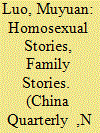

|
|
|
|
|
| Summary/Abstract |
This article investigates the recent proliferation of family-themed homosexual stories in China based on life-history interviews and participant observation conducted in Shenzhen. We develop the concept of “neo-Confucian homonormativity” – characterized by a harmonious relationship between gay men and their families of origin and their ability and aspiration to enter a monogamous relationship and become parents – to explain the production, circulation and consumption of these stories in the Chinese gay community. We argue that these stories are socially embedded actions enabled by the emerging neoliberal sexual politics in the Chinese gay community that influence the organization of the Chinese gay community and Chinese gay men's lived experiences. By analysing the emerging storytelling practices in the Chinese gay community, this article challenges the Western-centric way of theorizing homonormativity and opens up the possibility to conceptualize homonormativity from an Asian perspective.
|
|
|
|
|
|
|
|
|
|
|
|
|
|
|
|
| 5 |
ID:
119386


|
|
|
|
|
| Publication |
2013.
|
| Summary/Abstract |
This article addresses the potential that a kind of engaged research can have in current battles for social justice and in the transformation of college curricula as a way to recover the original critical spirit of ethnic studies. Building on critical race theory, I discuss the work of NGOs such as Human Rights First and Americans for Immigrant Justice on behalf of Haitian refugees and the role of literature in inspiring human rights actions that might redefine practices of citizenship and belonging. At a time when the United States recognises the rights of refugees but criminalises the search for asylum, coalition building between ethnic studies discourse, the legal academy and the community is vital to affirm and protect the internationally recognised rights of refugees. Crucial in this process is the role played by stories as a way to humanise the often impersonal topic of the immigration debate.
|
|
|
|
|
|
|
|
|
|
|
|
|
|
|
|
| 6 |
ID:
186842
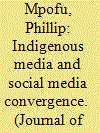

|
|
|
|
|
| Summary/Abstract |
Storytelling is ordinarily trivialised as an antiquated oramedia genre, and of less significance in Zimbabwean mainstream media and communication studies, hence it is understudied. Recent studies largely take a literary gaze on storytelling, and do not theorise it from an indigenous media viewpoint or appreciate its convergence with social media. Drawing on concepts of media convergence and the digital public sphere, this netnographic study examines the adaptation of storytelling on Twitter, SoundCloud and YouTube, focusing on patterns of production, delivery, participation, language forms, reception and audiences. The article shows inventive re-embodiment and adaptation of storytelling on online spaces, that is, the endurance and remaking of indigenous media in the context of new media and communication technologies. The manifestation of the folktale narrative style on social media exhibits the rise of a secondary form of orality recreated, reproduced and applied in the digital form and on social media. While digital and social media are perceived as threatening the continued existence of indigenous media, this article attests social media as breathing spaces for indigenous media.
|
|
|
|
|
|
|
|
|
|
|
|
|
|
|
|
| 7 |
ID:
142639


|
|
|
|
|
| Summary/Abstract |
Yolŋu people living in northeast Arnhem Land regularly celebrate their connections with the Macassan trepangers from Indonesian Sulawesi in storytelling, art and music. The history of this contact is well known in academic literature, and these stories of Macassan contact are told regularly by Yolŋu people to tourists visiting northeast Arnhem Land. This paper explores the impact that hearing stories about the Macassans from one Yolŋu family's tourism business had on a group of Australian Indonesian language teachers, visiting as part of an Endeavour Language Teaching Fellowship. It draws on ideas related to telling and hearing stories and argues that these particular stories enabled the teachers to make powerful connections: with each other and with Australia's histories and geographies. The paper also explores the ways in which the teachers went on to become storytellers themselves, using stories to make connections in their students' learning.
|
|
|
|
|
|
|
|
|
|
|
|
|
|
|
|
| 8 |
ID:
133258
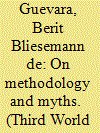

|
|
|
|
|
| Publication |
2014.
|
| Summary/Abstract |
Exploring the historiography of the International Crisis Group (icg), this article looks critically at the narratives surrounding the organisation's self-declared success. The focus is specifically on the so-called icg methodology, consisting of field-based research and analysis, practical policy recommendations and high-level advocacy. Combining a three-level approach to the analysis of organisational cultures with Yanow's concept of organisational myths, the article argues that the icg methodology contains a number of organisational myths that are meant to mask tensions and contradictions in the organisation's underpinning basic assumptions and values, which, if publicly discussed, could have the power to undermine its expert authority. The four myths looked at in detail are the 'field facts myth', the 'myth of flexible pragmatism', the 'myth of uniqueness' and the 'neutrality/independence myth'.
|
|
|
|
|
|
|
|
|
|
|
|
|
|
|
|
| 9 |
ID:
122649


|
|
|
|
|
| Publication |
2013.
|
| Summary/Abstract |
The promise of Elizabeth Dauphinee's The Politics Of Exile lies most prominently in its ability to exile us from an international relations scholarship trapped in an economy of colonial truth. It is this economy of colonial truth, also readable as Europe, that produces an international relations scholarship and pedagogy that not only self-consciously cleanses the academic world of other ways of learning and knowing but also induces an indifference or an instrumental orientation in its recipients. Reading Dauphinee's text alongside the transcript of a child detainee's interrogation in Guantánamo Bay as well as Chinua Achebe's Things Fall Apart, this article explores the ethical relations of responsibility that emerge as Dauphinee's novel sets out to move writers, researchers, and teachers of international relations away from an economy of colonial truth.
|
|
|
|
|
|
|
|
|
|
|
|
|
|
|
|
| 10 |
ID:
171919
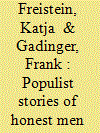

|
|
|
|
|
| Summary/Abstract |
This article proposes the methodological framework of visual narrative analysis through the study of images and narratives. We are interested in the appeal of political storytelling. In applying an approach of layered interpretation, we study images and slogans to consider the more complex underlying narratives in their political and cultural context. Our exploratory case studies draw on material from right-wing populist parties, namely election campaign posters from Germany and the UK as material for the analysis. We find that narratives operate with a ‘fantasmatic logic’, which adds fantasy to politics, to depoliticise and camouflage their radical intent and gain approval by making consent desirable. We identify two exemplary narratives (honest men under threat; proud mothers) that entrench traditional gender roles in accordance with patriarchy and nationalism. Theoretically, our approach contributes to debates in IR on cultural underpinnings in international politics and the construction of collective identities through shared/divided narratives. Visual narrative analysis provides a promising methodological tool for analysing visual representations in their productive relationship with text. This perspective foregrounds the power of political storytelling through fantasmatic appeal and fosters a better understanding of the global rise of populism.
|
|
|
|
|
|
|
|
|
|
|
|
|
|
|
|
| 11 |
ID:
122651
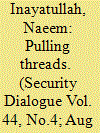

|
|
|
|
|
| Publication |
2013.
|
| Summary/Abstract |
The achievements of Elizabeth Dauphinee's (2013) The Politics of Exile are highlighted by means of two juxtapositions. First, Dauphinee's book invites a contrast to novels because it takes the form of a story. Specifically, Dauphinee's portrait of the vilified 'Serbs' is compared with how the Taliban are treated in Khalid Hosseini's The Kite Runner and Nadeem Aslam's The Wasted Vigil. Second, The Politics of Exile is examined as it emerges from Dauphinee's efforts to overcome the limits of her more academic work. The advantages of Dauphinee's approach relative to our standard research are presented along five dimensions: the responsibility of closure, the purpose of narration, the transparency of the message, how the work is shown, and the role of generosity. This article critiques Dauphinee's silence on the purpose of travel. It closes by suggesting what social theory can glean from The Politics of Exile. Social theorists can learn how to theorize more systematically, to weigh the relationship between the form and content in writing more judiciously, and to probe the deeper purposes of our intellectual life-work more fully.
|
|
|
|
|
|
|
|
|
|
|
|
|
|
|
|
| 12 |
ID:
188960
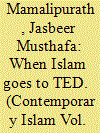

|
|
|
|
|
| Summary/Abstract |
New media studies on Islam are focused on investigating the characteristics of Islamic discourse or Muslim practices in digital landscape. Since there is increasing visibility of knowledge production on Islam by non-Islamic, secular middlebrow spaces such as TED, it is significant to examine their way of communicating Islamic ideas to a global audience. By conducting a discourse analysis of TED Talks on Islam, this study explores the dominant discursive strategies of TED Talks on Islam. By doing so, this study introduces how a more empirically and context-oriented understanding of the concept of the postsecular would benefit considerably from examining the discursive features of the contemporary nexus of Islam, new media, popular culture, and storytelling. Three main discourse features are found: (1) emphasis on a Judeo-Christian framework, (2) use of awe-inducing, personalized storytelling, and (3) secular translation of Islamic themes. While this emerging online-mediated discourse on Islam informs about new storytelling strategies, the language used adopts a highly attenuated perception of Islamic themes, and a great deal of traditional Islamic interpretation is replaced with excessively individualistic assumptions that are often tailored to cater to Western secular liberal mindsets.
|
|
|
|
|
|
|
|
|
|
|
|
|
|
|
|
|
|
|
|
|